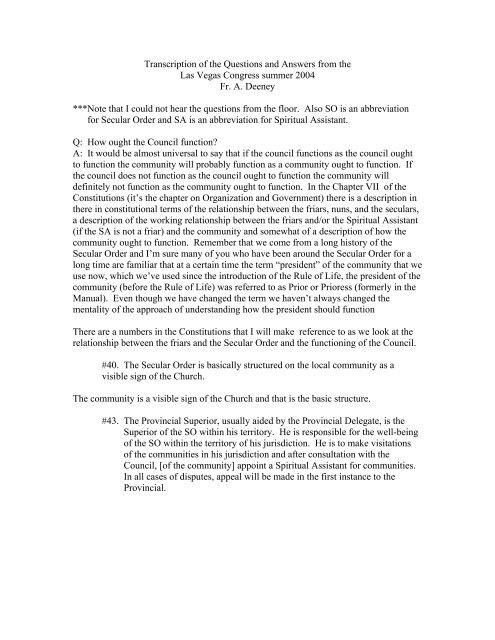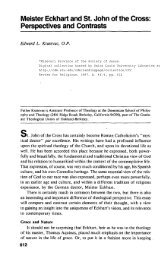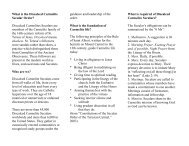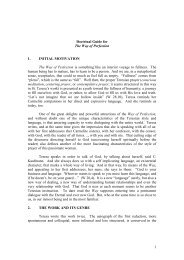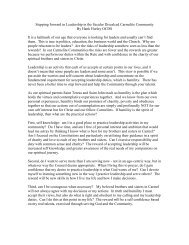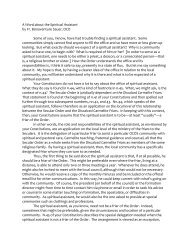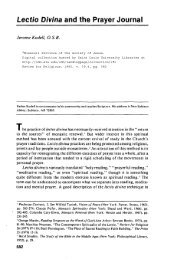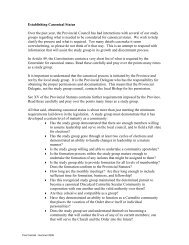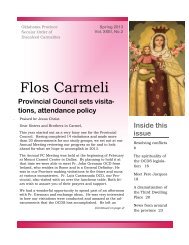Q&A with Fr Aloysius Deeney OCD - Secular Carmelites of the ...
Q&A with Fr Aloysius Deeney OCD - Secular Carmelites of the ...
Q&A with Fr Aloysius Deeney OCD - Secular Carmelites of the ...
You also want an ePaper? Increase the reach of your titles
YUMPU automatically turns print PDFs into web optimized ePapers that Google loves.
Transcription <strong>of</strong> <strong>the</strong> Questions and Answers from <strong>the</strong><br />
Las Vegas Congress summer 2004<br />
<strong>Fr</strong>. A. <strong>Deeney</strong><br />
***Note that I could not hear <strong>the</strong> questions from <strong>the</strong> floor. Also SO is an abbreviation<br />
for <strong>Secular</strong> Order and SA is an abbreviation for Spiritual Assistant.<br />
Q: How ought <strong>the</strong> Council function?<br />
A: It would be almost universal to say that if <strong>the</strong> council functions as <strong>the</strong> council ought<br />
to function <strong>the</strong> community will probably function as a community ought to function. If<br />
<strong>the</strong> council does not function as <strong>the</strong> council ought to function <strong>the</strong> community will<br />
definitely not function as <strong>the</strong> community ought to function. In <strong>the</strong> Chapter VII <strong>of</strong> <strong>the</strong><br />
Constitutions (it’s <strong>the</strong> chapter on Organization and Government) <strong>the</strong>re is a description in<br />
<strong>the</strong>re in constitutional terms <strong>of</strong> <strong>the</strong> relationship between <strong>the</strong> friars, nuns, and <strong>the</strong> seculars,<br />
a description <strong>of</strong> <strong>the</strong> working relationship between <strong>the</strong> friars and/or <strong>the</strong> Spiritual Assistant<br />
(if <strong>the</strong> SA is not a friar) and <strong>the</strong> community and somewhat <strong>of</strong> a description <strong>of</strong> how <strong>the</strong><br />
community ought to function. Remember that we come from a long history <strong>of</strong> <strong>the</strong><br />
<strong>Secular</strong> Order and I’m sure many <strong>of</strong> you who have been around <strong>the</strong> <strong>Secular</strong> Order for a<br />
long time are familiar that at a certain time <strong>the</strong> term “president” <strong>of</strong> <strong>the</strong> community that we<br />
use now, which we’ve used since <strong>the</strong> introduction <strong>of</strong> <strong>the</strong> Rule <strong>of</strong> Life, <strong>the</strong> president <strong>of</strong> <strong>the</strong><br />
community (before <strong>the</strong> Rule <strong>of</strong> Life) was referred to as Prior or Prioress (formerly in <strong>the</strong><br />
Manual). Even though we have changed <strong>the</strong> term we haven’t always changed <strong>the</strong><br />
mentality <strong>of</strong> <strong>the</strong> approach <strong>of</strong> understanding how <strong>the</strong> president should function<br />
There are a numbers in <strong>the</strong> Constitutions that I will make reference to as we look at <strong>the</strong><br />
relationship between <strong>the</strong> friars and <strong>the</strong> <strong>Secular</strong> Order and <strong>the</strong> functioning <strong>of</strong> <strong>the</strong> Council.<br />
#40. The <strong>Secular</strong> Order is basically structured on <strong>the</strong> local community as a<br />
visible sign <strong>of</strong> <strong>the</strong> Church.<br />
The community is a visible sign <strong>of</strong> <strong>the</strong> Church and that is <strong>the</strong> basic structure.<br />
#43. The Provincial Superior, usually aided by <strong>the</strong> Provincial Delegate, is <strong>the</strong><br />
Superior <strong>of</strong> <strong>the</strong> SO <strong>with</strong>in his territory. He is responsible for <strong>the</strong> well-being<br />
<strong>of</strong> <strong>the</strong> SO <strong>with</strong>in <strong>the</strong> territory <strong>of</strong> his jurisdiction. He is to make visitations<br />
<strong>of</strong> <strong>the</strong> communities in his jurisdiction and after consultation <strong>with</strong> <strong>the</strong><br />
Council, [<strong>of</strong> <strong>the</strong> community] appoint a Spiritual Assistant for communities.<br />
In all cases <strong>of</strong> disputes, appeal will be made in <strong>the</strong> first instance to <strong>the</strong><br />
Provincial.
#44. The SA to each community is usually a friar <strong>of</strong> <strong>the</strong> Order. His duty is to<br />
give spiritual aid to <strong>the</strong> community (not individuals) so that its<br />
members may be guided in <strong>the</strong>ir vocation and may correspond <strong>with</strong> it as<br />
perfectly as possible. He will also endeavor to promote solidarity<br />
between <strong>the</strong> secular community and <strong>the</strong> friars and nuns <strong>of</strong> <strong>the</strong> Order. At<br />
<strong>the</strong> invitation <strong>of</strong> <strong>the</strong> council he may attend meetings <strong>of</strong> <strong>the</strong> Council,<br />
<strong>with</strong>out <strong>the</strong> right to vote (this is new) At <strong>the</strong> different stages <strong>of</strong> formation<br />
<strong>of</strong> <strong>the</strong> candidates, he will be available to interview <strong>the</strong>m. The Council<br />
may consult him about <strong>the</strong> suitability <strong>of</strong> <strong>the</strong> candidate to assume <strong>the</strong><br />
responsibility <strong>of</strong> <strong>the</strong> vocation to <strong>the</strong> SO. He will support <strong>the</strong> formation <strong>of</strong><br />
<strong>the</strong> community by his availability to <strong>the</strong> director <strong>of</strong> formation. However,<br />
he may not be <strong>the</strong> director <strong>of</strong> formation. The SA must be well-versed in<br />
Carmelite spirituality and well-informed in <strong>the</strong> Church’s teaching<br />
concerning <strong>the</strong> role <strong>of</strong> lay people in <strong>the</strong> Church.<br />
#46. The Council, composed <strong>of</strong> <strong>the</strong> President and three Councilors and <strong>the</strong><br />
Director <strong>of</strong> Formation, constitutes <strong>the</strong> immediate authority <strong>of</strong> <strong>the</strong><br />
Community.<br />
Who is <strong>the</strong> superior <strong>of</strong> <strong>the</strong> community? The Council, not <strong>the</strong> president, not <strong>the</strong> Formation<br />
Director not <strong>the</strong> SA. It is <strong>the</strong> council. This is not new. This was in <strong>the</strong> Rule <strong>of</strong> Life.<br />
And <strong>the</strong> next sentence [in <strong>the</strong> Constitutions] is lifted right out <strong>of</strong> <strong>the</strong> Rule <strong>of</strong> Life…<br />
The primary responsibility <strong>of</strong> <strong>the</strong> Council is <strong>the</strong> formation and Christian<br />
and Carmelite maturing <strong>of</strong> <strong>the</strong> members <strong>of</strong> <strong>the</strong> community.<br />
The Council !! Not <strong>the</strong> president, not any one councilor, not <strong>the</strong> ex-president, not <strong>the</strong><br />
foundress <strong>of</strong> <strong>the</strong> community.<br />
#47. The Council has <strong>the</strong> authority:<br />
a) to admit candidates to formation, <strong>the</strong> Promises and <strong>the</strong> vows.<br />
b) to reduce, for adequate reasons, <strong>the</strong> period <strong>of</strong> formation before<br />
temporary Promises, <strong>with</strong> <strong>the</strong> permission <strong>of</strong> <strong>the</strong> Provincial;<br />
c) to convene <strong>the</strong> community for <strong>the</strong> triennial elections;<br />
d) to replace, for a serious reason, a member <strong>of</strong> <strong>the</strong> Council itself;<br />
e) to dismiss a member <strong>of</strong> <strong>the</strong> community, should this be<br />
necessary after consulting <strong>the</strong> Provincial;<br />
f) to receive a member transferring from ano<strong>the</strong>r community;<br />
g) if a matter should arise that is outside <strong>the</strong> competence <strong>of</strong> <strong>the</strong><br />
Council, it is <strong>the</strong> obligation <strong>of</strong> <strong>the</strong> President to bring it to <strong>the</strong><br />
attention <strong>of</strong> <strong>the</strong> Provincial.<br />
The Council meets frequently and always and always when necessary in<br />
reference to taking care <strong>of</strong> formation programs and <strong>the</strong> growth <strong>of</strong> <strong>the</strong>ir<br />
own community.<br />
2
I think <strong>the</strong> Rule <strong>of</strong> Life said <strong>the</strong> Council is to meet once a year. That seems awfully<br />
minimal if <strong>the</strong> Council is going to function as a good Council. If <strong>the</strong> primary<br />
responsibility <strong>of</strong> <strong>the</strong> Council is <strong>the</strong> formation and Christian Carmelite maturing <strong>of</strong> <strong>the</strong><br />
members, meeting once a year will not help <strong>the</strong>m to be responsible. No one person is<br />
responsible for this. The Council is responsible for <strong>the</strong> formation and <strong>the</strong> Christian and<br />
Carmelite maturing <strong>of</strong> <strong>the</strong> members.<br />
#48. The General Superior, <strong>the</strong> Provincial Superior and <strong>the</strong> Council <strong>of</strong> <strong>the</strong><br />
community are <strong>the</strong> legitimate superiors <strong>of</strong> <strong>the</strong> SO.<br />
#51. The President, elected from among those who have made final promises,<br />
has <strong>the</strong> duty to convoke and preside over <strong>the</strong> meetings <strong>of</strong> <strong>the</strong> community.<br />
He should show fraternal service to all <strong>the</strong> members <strong>of</strong> <strong>the</strong> community;<br />
Foster a spirit <strong>of</strong> Christian and Carmelite affability, being careful to avoid<br />
any demonstration <strong>of</strong> preference for some members over o<strong>the</strong>rs;<br />
coordinate contacts <strong>with</strong> those members <strong>of</strong> <strong>the</strong> community who because<br />
<strong>of</strong> age, illness, distance or o<strong>the</strong>r reasons, are not able to attend meetings;<br />
aid <strong>the</strong> Director <strong>of</strong> Formation and Spiritual Assistant in carrying out <strong>the</strong>ir<br />
responsibilities; in <strong>the</strong>ir absence, but only temporarily, he may take <strong>the</strong>ir<br />
place or designate ano<strong>the</strong>r to do so from among those who have made<br />
definitive promises.<br />
#52. The responsibility <strong>of</strong> <strong>the</strong> three Councilors is to form, <strong>with</strong> <strong>the</strong> President,<br />
<strong>the</strong> government <strong>of</strong> <strong>the</strong> community and to support <strong>the</strong> director <strong>of</strong> formation.<br />
Generally <strong>the</strong>y are community members <strong>with</strong> definitive promises. In<br />
particular circumstances, members <strong>with</strong> first promises can serve as<br />
councilors.<br />
Those numbers, 40, 43, 44, 46, 47, 48, 51 and 52 describe, in constitutional terms <strong>the</strong><br />
relationship between <strong>the</strong> friars (<strong>the</strong> friars have a role and an obligation to <strong>the</strong> seculars).<br />
Those numbers also describe <strong>the</strong> responsibility <strong>of</strong> <strong>the</strong> seculars to take charge <strong>of</strong> <strong>the</strong>ir<br />
part <strong>of</strong> <strong>the</strong> Order. It bears repeating over and over again, that <strong>the</strong> council is <strong>the</strong> superior<br />
<strong>of</strong> <strong>the</strong> community and any one member who speaks, who is a member <strong>of</strong> <strong>the</strong> council,<br />
speaks for <strong>the</strong> council. But that person can only speak for <strong>the</strong> council IF that person<br />
speaks what <strong>the</strong> council thinks. The president doesn’t speak and <strong>the</strong>n say to <strong>the</strong> council,<br />
this is what we are doing. That’s not functioning as a Council, it’s not working that way.<br />
The president primarily is <strong>the</strong> spokesperson for <strong>the</strong> authority <strong>of</strong> <strong>the</strong> community which is<br />
<strong>the</strong> council. Now, again, we have come from this tradition where we have had this<br />
Prior/Prioress mentality, that <strong>the</strong> person who was <strong>the</strong> president was <strong>the</strong> superior <strong>of</strong> <strong>the</strong><br />
community. As a matter <strong>of</strong> fact, I have had many experiences <strong>of</strong> being asked (and<br />
remember in 1974 when <strong>the</strong> Rule <strong>of</strong> Life was issued and finally approved in 1979 and<br />
this structure was present in <strong>the</strong> Rule <strong>of</strong> Life, that <strong>the</strong> Council is <strong>the</strong> superior <strong>of</strong> <strong>the</strong><br />
community) who is <strong>the</strong> superior <strong>of</strong> <strong>the</strong> community and being answered <strong>with</strong> “<strong>the</strong><br />
president” and this is after 30 years. It takes a long time for us to understand change and<br />
to put change into practice.<br />
3
Now sometimes it is true because some presidents have acted as superiors <strong>of</strong> <strong>the</strong><br />
community. And sometimes it is true that ex-presidents act as superior <strong>of</strong> <strong>the</strong><br />
community. I don’t know if that is true or not true <strong>of</strong> your communities, but I suspect it<br />
is true in some places because this happens. It happens in monastery’s <strong>of</strong> nuns, it<br />
happens in provinces <strong>of</strong> friars and it happens in communities <strong>of</strong> <strong>the</strong> <strong>Secular</strong> Order, where<br />
people who had authority don’t let go <strong>of</strong> authority. They understand authority as<br />
control <strong>of</strong> <strong>the</strong> community and not as service <strong>of</strong> <strong>the</strong> community.<br />
If <strong>the</strong> Council is going to function as a council <strong>the</strong>n <strong>the</strong>y might have to meet frequently<br />
because decisions have to be made. So that’s why we put in <strong>the</strong>re ra<strong>the</strong>r than once a year<br />
or whenever necessary…it says <strong>the</strong> council meets frequently and always when necessary<br />
in reference to talking about <strong>the</strong> care and formation and growth <strong>of</strong> <strong>the</strong>ir own community.<br />
So if <strong>the</strong>re are decisions that have to be made in <strong>the</strong> name <strong>of</strong> <strong>the</strong> council <strong>the</strong> council has<br />
to meet in order to arrive at that decision. The council must meet and discuss and when<br />
<strong>the</strong> president speaks, <strong>the</strong> president speaks in <strong>the</strong> name <strong>of</strong> <strong>the</strong> council. Not for <strong>the</strong> council<br />
and I make a distinction here, I (<strong>the</strong> president) am going to speak for <strong>the</strong>m and afterwards<br />
tell <strong>the</strong>m (<strong>the</strong> council) what I said. I (<strong>the</strong> president) am going to speak in <strong>the</strong>ir place. But<br />
if I (<strong>the</strong> president) speak in <strong>the</strong>ir name <strong>the</strong>n I speak what our (<strong>the</strong> councils) decision has<br />
been.<br />
When I was provincial I had three different councilors, and hopefully, in our province,<br />
when we decided things we decided things in <strong>the</strong> council by voting on things. And<br />
sometimes <strong>the</strong> vote was 5 to zero and sometimes <strong>the</strong> vote was 4 to 1 and I was <strong>the</strong> 1.<br />
But <strong>the</strong> decision was always announced that “this is what <strong>the</strong> council has decided”.<br />
I made reference yesterday to <strong>the</strong> fact that sometimes it happens that people (councilors)<br />
are afraid to speak at a council meeting. The reason <strong>the</strong>y are afraid to speak at a council<br />
meeting is because <strong>the</strong>y are somehow going to be punished by what <strong>the</strong>y think.<br />
How are <strong>the</strong>y going to be punished by saying what <strong>the</strong>y think….because it is going to be<br />
repeated. Anybody who is capable (we are all capable) <strong>of</strong> repeating what is said in<br />
council meetings in order to divide <strong>the</strong> community should not be a council member.<br />
They don’t have <strong>the</strong> necessary qualities for being a council member because <strong>the</strong>y are not<br />
<strong>the</strong>re for service to <strong>the</strong> community. And that prevents <strong>the</strong> council from being able to<br />
speak. It prevents <strong>the</strong> council from being able to function.<br />
4
Ano<strong>the</strong>r point in this relationship, and this is why I read <strong>the</strong> section on <strong>the</strong> SA, many<br />
times councils were very dependent on <strong>the</strong> decisions or opinions made by <strong>the</strong> assistant.<br />
It’s not <strong>the</strong> Spiritual Assistants community. It’s your community. If I’m <strong>the</strong> assistant<br />
you can ask me anything and I am not afraid to give my opinion. If you don’t ask me, I<br />
have no right to give it. I have a right to give it in my community to which I belong as a<br />
Carmelite, which is <strong>the</strong> friars. That’s where I have <strong>the</strong> obligation to express my opinion.<br />
But if I am <strong>the</strong> assistant to <strong>the</strong> community I may be able to say something personally to<br />
people but I don’t have <strong>the</strong> right to interfere in <strong>the</strong> decision <strong>of</strong> <strong>the</strong> community. I think<br />
that <strong>the</strong> people who were handling <strong>the</strong> SO before me will be able, also, to testify, that one<br />
<strong>of</strong> <strong>the</strong> most frequent complaints received ei<strong>the</strong>r in provinces or generally are about SA<br />
who become dominators <strong>of</strong> communities. No one has <strong>the</strong> right to impose on any<br />
community any person.<br />
There is a case in <strong>the</strong> Philippines where every Christmas (<strong>the</strong> community met at <strong>the</strong><br />
monastery <strong>of</strong> nuns) Mo<strong>the</strong>r Prioress handed a list <strong>of</strong> people to <strong>the</strong> president <strong>of</strong> <strong>the</strong> SO<br />
telling <strong>the</strong>m to enroll <strong>the</strong>m, as members <strong>of</strong> <strong>the</strong> SO because <strong>the</strong>y were <strong>the</strong>ir benefactors for<br />
that year. So <strong>the</strong>y just enrolled <strong>the</strong>m in <strong>the</strong> SO, she just handed <strong>the</strong>m <strong>the</strong> list and <strong>the</strong>y<br />
enrolled <strong>the</strong>m in <strong>the</strong> SO. They had something like 180 members on <strong>the</strong>ir list and <strong>the</strong><br />
majority <strong>of</strong> <strong>the</strong>m were benefactors who had never seen <strong>the</strong> inside <strong>of</strong> <strong>the</strong> SO meeting.<br />
There are o<strong>the</strong>r ways that people impose members and this happens <strong>with</strong> assistants. My<br />
cousins, bro<strong>the</strong>r-in-laws aunts uncles niece, she is very holy, goes to Eucharistic<br />
Adoration every day…..Your council has to decide this.<br />
What are <strong>the</strong> responsibilities <strong>of</strong> <strong>the</strong> person who is <strong>the</strong> assistant to <strong>the</strong> community. He<br />
does not interfere <strong>with</strong> <strong>the</strong> council. The council has <strong>the</strong> obligation to look after <strong>the</strong> good<br />
<strong>of</strong> <strong>the</strong> community. The council can only function is <strong>the</strong> council is able to speak to each<br />
o<strong>the</strong>r. Anything that prevents a councilor from being honest in expressing his/her<br />
opinion <strong>the</strong>re is a question <strong>the</strong>re as to whe<strong>the</strong>r or not <strong>the</strong> council is a good council. There<br />
is <strong>the</strong> necessity for confidentiality in <strong>the</strong> council is number one. If I go to a council<br />
meeting, whe<strong>the</strong>r I am a councilor in my province or <strong>the</strong> Provincial, and have to weigh<br />
what I am going to say because I am afraid somebody is going to repeat it <strong>the</strong>n <strong>the</strong> Holy<br />
Spirit is prevented from working in <strong>the</strong> council. And if somebody comes to <strong>the</strong> council<br />
and is afraid I am going to take it personally that if <strong>the</strong>y don’t agree <strong>with</strong> me <strong>the</strong>refore<br />
<strong>the</strong>y don’t like me. Or if I am going to be hurt because somebody disagrees <strong>with</strong> me<br />
<strong>the</strong>re is something wrong <strong>with</strong> me. And because <strong>the</strong>re is something wrong <strong>with</strong> me in<br />
that sense I don’t have <strong>the</strong> qualities necessary to be a good member <strong>of</strong> <strong>the</strong> council.<br />
Number 47 gives <strong>the</strong> a to g <strong>of</strong> responsibilities but number 46 it says that <strong>the</strong> primary<br />
responsibility <strong>of</strong> <strong>the</strong> council is <strong>the</strong> formation <strong>of</strong> <strong>the</strong> Christian and Carmelite maturing <strong>of</strong><br />
<strong>the</strong> members <strong>of</strong> <strong>the</strong> community.<br />
Ano<strong>the</strong>r thing, about elections. We are human beings, we are Teresian <strong>Carmelites</strong> and St.<br />
Teresa <strong>of</strong> course, reminds us that it is stupid to think that we are angels as long as we<br />
have <strong>the</strong>se bodies. And so we are going to be subject to anything that is human.<br />
Remembering that, elections are not popularity contests. If you are elected it is not<br />
because you are <strong>the</strong> most popular, hopefully it might be because you are <strong>the</strong> most<br />
5
capable. The most popular person in <strong>the</strong> community may not be <strong>the</strong> most capable person<br />
in <strong>the</strong> community for certain positions or certain jobs. And if you are not elected it is not<br />
because you are not popular. I can give you an example <strong>of</strong> someone who was at <strong>the</strong><br />
Congress in Mexico in <strong>the</strong> year 2000 who returned to her province and was not elected<br />
president and left <strong>the</strong> <strong>Secular</strong> Order and left <strong>the</strong> Church, became a Presbyterian as a<br />
matter <strong>of</strong> fact. We are capable <strong>of</strong> anything. Remember that. Election to a position in <strong>the</strong><br />
community are for <strong>the</strong> purpose <strong>of</strong> doing a service to <strong>the</strong> community. No one is emperor<br />
or empress <strong>of</strong> <strong>the</strong> <strong>Secular</strong> Order. In <strong>the</strong> religious life no one has a vocation to hierarchy.<br />
We are (a councilor or president) and <strong>the</strong>n we go back to being (a regular member). The<br />
hierarchical structure belongs to <strong>the</strong> bishops and all that stuff. That’s <strong>the</strong>ir structure. Our<br />
structure is completely on a rotation basis. You are and <strong>the</strong>n you are not and you<br />
might be again or you might not be again but you are always a member. You are<br />
always a visible sign <strong>of</strong> <strong>the</strong> Church because you are a member, not because you are<br />
president or a council or <strong>the</strong> formation director. If your community is only capable <strong>of</strong><br />
having <strong>the</strong> same person as president or <strong>the</strong> same person as formation director something<br />
is not working because part <strong>of</strong> <strong>the</strong> job <strong>of</strong> being a good community is preparing people to<br />
be president and formation director. If you have a perpetual president or <strong>the</strong>re is only one<br />
person who can do <strong>the</strong> formation and your council is always <strong>the</strong> same people (<strong>the</strong>y just<br />
switch places) it’s not working. The Holy Spirit is not able to breath in circumstances<br />
being so confined. The Holy Spirit is able to work because we are flexible enough to do<br />
what God wants, all <strong>of</strong> us, toge<strong>the</strong>r in <strong>the</strong> community. One <strong>of</strong> <strong>the</strong> virtues <strong>of</strong> living in<br />
community is “holy flexibility”. We need this in <strong>the</strong> structures <strong>of</strong> our communities. I<br />
have seen in some communities a rigidity about a community because it is <strong>the</strong> same<br />
people all <strong>the</strong> time. And <strong>the</strong> community reflects those personalities instead <strong>of</strong> <strong>the</strong> one<br />
personality that we all owe allegiance, we have personalities taking <strong>the</strong> place <strong>of</strong> Jesus and<br />
that is because <strong>the</strong> councils do not function as councils. They function as positions and<br />
not in service but in control. Control is not service. Guidance, instruction, leadership<br />
that is service but not controlling. The relationship that <strong>the</strong>n exists between <strong>the</strong> friars and<br />
<strong>the</strong> (nuns) and <strong>the</strong> <strong>Secular</strong> Order is <strong>the</strong>n this flexible one <strong>of</strong> service and support. We (<strong>the</strong><br />
friars) are not always clear on how we are working this out but we are working this out.<br />
And you have to be clear to. Your councils have to be able to take this responsibility and<br />
for this to happen <strong>the</strong>re has to be communication among <strong>the</strong> council members. It is true<br />
that <strong>the</strong> Spiritual Assistant can help but it is a mistake for you to look to <strong>the</strong> Spiritual<br />
Assistant to give you <strong>the</strong> answer. He can help, guide, support, he may be able to correct<br />
certain things but if you always have him give <strong>the</strong> answer to your questions you will not<br />
function as a council. You will be five dependent people, members <strong>of</strong> <strong>the</strong> secular order,<br />
sometimes dependent on someone who is not even a Carmelite. This is not talking about<br />
spirituality, this is talking about governance and organization. This is a Carmelite<br />
organization. One <strong>of</strong> <strong>the</strong> main reasons why we had to redefine <strong>the</strong> role <strong>of</strong> Spiritual<br />
Assistant is because we were very close to having at least half <strong>of</strong> <strong>the</strong> <strong>Secular</strong> Order<br />
communities in <strong>the</strong> world having someone who is not a Carmelite for a Spiritual<br />
Assistant because <strong>of</strong> <strong>the</strong> way <strong>the</strong> <strong>Secular</strong> Order is growing in places around <strong>the</strong> world<br />
where <strong>the</strong>re are no Carmelite friars. That’s why it says <strong>the</strong> Spiritual Assistant is usually<br />
a friar <strong>of</strong> <strong>the</strong> Order. So we can’t have <strong>the</strong> structure depending on someone who is not a<br />
member <strong>of</strong> <strong>the</strong> Order.<br />
6
In <strong>the</strong> Ritual where it spoke <strong>of</strong> <strong>the</strong> SA was a representative <strong>of</strong> <strong>the</strong> Order…and that is all<br />
well and good in Italy or Spain practically all <strong>of</strong> <strong>the</strong> SO communities meet in <strong>the</strong><br />
monastery <strong>of</strong> <strong>the</strong> friars where <strong>the</strong> friar can roll out <strong>of</strong> bed and into <strong>the</strong> meeting. For many<br />
<strong>of</strong> your communities to have a friar come he has to take a plane to get <strong>the</strong>re or drive for a<br />
long time or in <strong>the</strong> Philippines take a boat ride for hours to get from one place to ano<strong>the</strong>r<br />
to attend a meeting. The SA cannot be <strong>the</strong> depending point for your function as a<br />
council. What I am trying to describe is how <strong>the</strong> council should function, <strong>the</strong> type <strong>of</strong><br />
people who should be on <strong>the</strong> council and how important confidentiality is for <strong>the</strong> council<br />
to function.<br />
I was asked a lot <strong>of</strong> questions yesterday and this morning about councils from different<br />
areas. How <strong>the</strong> council functions, how things should be decided. And this is new.<br />
Where it says in one place that I read (number 43) about <strong>the</strong> responsibility <strong>of</strong> <strong>the</strong><br />
provincial superior usually aided by <strong>the</strong> provincial delegate, is <strong>the</strong> Superior <strong>of</strong> <strong>the</strong> <strong>Secular</strong><br />
Order <strong>with</strong>in his territory responsible for <strong>the</strong> well being <strong>of</strong> <strong>the</strong> <strong>Secular</strong> Order <strong>with</strong>in <strong>the</strong><br />
territory <strong>of</strong> his jurisdiction. He is to make visitation to <strong>the</strong> community. When <strong>the</strong><br />
Provincial through his Delegate makes visitations he has certain canonical responsibilities<br />
and abilities to decide things. One <strong>of</strong> <strong>the</strong> things I suggest when I speak to <strong>the</strong> friars,<br />
especially <strong>the</strong> Provincial Delegates is for <strong>the</strong> formation <strong>of</strong> <strong>the</strong> communities as<br />
communities concentrating specifically on <strong>the</strong> formation <strong>of</strong> <strong>the</strong> leaders and <strong>the</strong> formation<br />
people and <strong>the</strong> council. If <strong>the</strong> council begins to function <strong>with</strong> this kind <strong>of</strong> flexibility <strong>the</strong>n<br />
it is <strong>the</strong> most capable person who becomes a rotating superior or member <strong>of</strong> <strong>the</strong> council,<br />
changing, <strong>the</strong>n <strong>the</strong> community begins to form itself as a community not just a collection<br />
<strong>of</strong> individuals because what happens when <strong>the</strong> council is fractured, when its three against<br />
two against three or five all person shows. Then everyone in community just becomes an<br />
individual and <strong>the</strong> community doesn’t function.<br />
Q:<br />
A: It should be <strong>the</strong> responsibility <strong>of</strong> <strong>the</strong> three councilors to form <strong>with</strong> <strong>the</strong> president and<br />
<strong>the</strong> Formation Director because <strong>the</strong> director <strong>of</strong> formation is part <strong>of</strong> <strong>the</strong> council. One <strong>of</strong><br />
<strong>the</strong> things that <strong>the</strong> Provincial Statutes are to determine is <strong>the</strong> procedure for election and<br />
<strong>the</strong> responsibilities <strong>of</strong> <strong>the</strong> three councilors. The Presidents responsibilities are in number<br />
51 and I want to underline one line <strong>of</strong> that, “…to foster a spirit <strong>of</strong> Christian and Carmelite<br />
affability being careful to avoid any demonstration <strong>of</strong> preference for some members over<br />
o<strong>the</strong>rs.”<br />
It sometimes happens sometimes that presidents, especially if <strong>the</strong>y do not have this<br />
mentality <strong>of</strong> <strong>the</strong> Constitutions, consult <strong>with</strong> o<strong>the</strong>r members <strong>of</strong> <strong>the</strong> community who are<br />
not on <strong>the</strong> council and <strong>the</strong>y are <strong>the</strong> ones that decide and <strong>the</strong> president brings <strong>the</strong>ir decision<br />
to <strong>the</strong> council.<br />
Q:<br />
A: The secretary is not a member <strong>of</strong> <strong>the</strong> council. Mute. But again, confidentiality<br />
extends to her and when <strong>the</strong> treasurer is at <strong>the</strong> meetings, again, confidentiality.<br />
7
Q:<br />
A: I talked about community when I got to <strong>the</strong> 5 th “M” meetings and I talked about<br />
formation, information, and fellowship. The actual sharing/wasting time toge<strong>the</strong>r. If<br />
somebody has too many important things to do to spend time relaxing <strong>with</strong> you <strong>the</strong>y are<br />
not going to be good members <strong>of</strong> <strong>the</strong> community. The community prays toge<strong>the</strong>r when<br />
you come to meetings, your receive instruction and you discuss toge<strong>the</strong>r important<br />
aspects <strong>of</strong> <strong>the</strong> community but <strong>the</strong>re also has to be a fellowship part. This is taking a hint<br />
from St. Teresa, when she was forming St. John <strong>of</strong> <strong>the</strong> Cross to be a discalced Carmelite<br />
in chapter 17 (I think) in The Book <strong>of</strong> Foundations, talk about taking him to Valladolid<br />
and she said, although <strong>the</strong>re were many things that he could teach me about prayer <strong>the</strong><br />
only thing I could really teach him was recreation, our style <strong>of</strong> community. So we take<br />
that hint that fellowship is actually part <strong>of</strong> formation or community. Recreation is a very<br />
Teresian term. We are going to recreation….we are going to waste time toge<strong>the</strong>r. And<br />
for some people it is a waste <strong>of</strong> time and <strong>the</strong>y are not very good members <strong>of</strong> community.<br />
If you don’t know how to waste time toge<strong>the</strong>r you are not building a relationship. It’s<br />
really not wasting time, it using time to relax toge<strong>the</strong>r. So <strong>the</strong> fellowship part is an<br />
integral part <strong>of</strong> your community meetings. It’s not just to get information, to do serious<br />
things and it is also time to do what you do so well, chit chat.<br />
There are 3,500 secular order members in Korea and <strong>the</strong>y were in nine communities.<br />
They didn’t even know each o<strong>the</strong>rs names. So when I went <strong>the</strong>re I divided <strong>the</strong>m into 31<br />
communities. They did not have <strong>the</strong> understanding <strong>of</strong> community. They had <strong>the</strong><br />
understanding <strong>of</strong> going, praying, listening to a lecture and going home. They know a lot<br />
about Carmelite spirituality but <strong>the</strong>y need to develop into communities.<br />
So <strong>the</strong>re are two things, <strong>the</strong> leadership must be <strong>the</strong> council that functions as a council and<br />
<strong>the</strong>re must be fellowship in <strong>the</strong> community because that is what gets over divisions, if<br />
you get to know everybody.<br />
Q:<br />
A: A council member is always free to talk to ano<strong>the</strong>r council member or <strong>the</strong> president<br />
about something, but if <strong>the</strong>y think a decision must be made <strong>with</strong> regards to a certain issue<br />
in <strong>the</strong> name <strong>of</strong> <strong>the</strong> community, which is <strong>the</strong> councils responsibility, <strong>the</strong>n <strong>the</strong> president is<br />
obliged to call a meeting <strong>of</strong> <strong>the</strong> council to discuss it.<br />
Remember no one thing has to be decided by <strong>the</strong> end <strong>of</strong> each meeting. You can continue<br />
to discuss it at ano<strong>the</strong>r time, maybe you need time to look at <strong>the</strong> Constitutions in regard to<br />
<strong>the</strong> issue and to think about things before arriving at a decision. It’s better to arrive at a<br />
good decision late than a bad decision on time.<br />
8
Q:<br />
A: It is <strong>the</strong> responsibility <strong>of</strong> <strong>the</strong> President to convoke and preside over <strong>the</strong> meetings <strong>of</strong><br />
<strong>the</strong> council. It is <strong>the</strong> responsibility <strong>of</strong> <strong>the</strong> Delegate when making visitations to <strong>the</strong><br />
community to see how <strong>the</strong> council is functioning and to correct <strong>the</strong> president if <strong>the</strong><br />
president says well <strong>the</strong>y are going to arrive at a decision I don’t agree <strong>with</strong>. The<br />
president is not <strong>the</strong> boss. It is important for you to study <strong>the</strong> whole structure that is in <strong>the</strong><br />
Constitution. It is <strong>the</strong> responsibility <strong>of</strong> <strong>the</strong> Delegate, when visiting communities, to pay<br />
attention to how <strong>the</strong> council is functioning.<br />
If we can make sure that <strong>the</strong> council is functioning as a council we are doing our job <strong>of</strong><br />
forming <strong>the</strong> community. Because everything else falls in line if <strong>the</strong> council functions<br />
properly. Both <strong>the</strong> councilors and <strong>the</strong> community feel <strong>the</strong>mselves to be a part <strong>of</strong> <strong>the</strong><br />
community, that <strong>the</strong>y are not under <strong>the</strong> dominance <strong>of</strong> one person. If <strong>the</strong> council members<br />
feel that way <strong>the</strong> community feels much more that way. If <strong>the</strong> president is not <strong>the</strong>re <strong>the</strong>n<br />
<strong>the</strong> formation director can call a council meeting.<br />
Q:<br />
A: Minutes should always be kept <strong>of</strong> <strong>the</strong> council meetings.<br />
Q:<br />
A: I will be going to India to visit all five provinces in India and sent ahead, a letter to<br />
ask <strong>the</strong>m to organize, as <strong>the</strong> first meeting in each province, a meeting <strong>with</strong> <strong>the</strong> friars who<br />
are assistants to <strong>the</strong> communities. It is a very difficult meeting to have because some<br />
have been spiritual assistants for 20-30 years and have done things in a certain way and<br />
<strong>the</strong>y are used to doing things that way and <strong>the</strong>y don’t know <strong>the</strong> Constitutions and don’t<br />
appreciate <strong>the</strong> change. Many times out <strong>of</strong> good will <strong>the</strong>y say ‘I know <strong>the</strong>y are going to<br />
try this, but I know it’s not going to work because I remember 15 years ago <strong>the</strong>y tried it<br />
and it didn’t work.’ So <strong>the</strong> SA will step in and say ‘don’t do that, you cannot do that you<br />
have to do this.’ And this response from <strong>the</strong> SA is out <strong>of</strong> good will. The unfortunate by<br />
product <strong>of</strong> that response is that you (president and councilors) don’t LEARN that is<br />
doesn’t work because you have to do what he says. Whereas, allowing <strong>the</strong> council to<br />
make <strong>the</strong> wrong decision and having to correct it is <strong>the</strong> idea in <strong>the</strong>se Constitutions now<br />
that <strong>the</strong> council has <strong>the</strong> authority and <strong>the</strong> Spiritual Assistant doesn’t have <strong>the</strong> veto power,<br />
so <strong>the</strong> council is responsible for it’s decisions good or bad. If you admit <strong>the</strong> wrong<br />
person to <strong>the</strong> community to make promises it is your own fault. It’s not <strong>the</strong> Spiritual<br />
Assistants responsibility any more. You have to develop <strong>the</strong> courage to say NO to<br />
people. Which is not an easy thing to do. It has nothing to do <strong>with</strong> like or dislike, it has<br />
to do <strong>with</strong> ‘do <strong>the</strong>y belong’. Will <strong>the</strong>y be good members <strong>of</strong> <strong>the</strong> community. Now that is<br />
your decision to make in your communities. The whole council decides yes or no. And<br />
<strong>the</strong>y have to inform <strong>the</strong> person, that’s <strong>the</strong> hard part.<br />
(He goes back to <strong>the</strong> subject <strong>of</strong> meeting <strong>with</strong> Spiritual Assistants) I like having meetings<br />
<strong>with</strong> assistants because it gives <strong>the</strong>m <strong>the</strong> chance to ask questions apart from <strong>the</strong> seculars<br />
because <strong>the</strong>y don’t always know if <strong>the</strong>y are doing good or not, 9 . 9 times out <strong>of</strong> 10 <strong>the</strong>y<br />
are doing what <strong>the</strong>y think is right. But <strong>the</strong>y don’t always understand that you have to do<br />
it on your own.<br />
9
Q:<br />
A: The secretary <strong>of</strong> <strong>the</strong> council has <strong>the</strong> responsibility <strong>of</strong> keeping an update to date<br />
register <strong>of</strong> <strong>the</strong> community, recording <strong>the</strong> elections, admissions, promises and dismissals.<br />
The Constitutions say that “The Secretary attends <strong>the</strong> Council meetings and records <strong>the</strong><br />
minutes <strong>of</strong> <strong>the</strong> meeting <strong>with</strong>out <strong>the</strong> right to vote”.<br />
Q:<br />
A The secretary is subject to <strong>the</strong> same confidentiality (as <strong>the</strong> members <strong>of</strong> <strong>the</strong> council).<br />
The minutes have to be kept so that <strong>the</strong> next council knows what has transpired before.<br />
10


